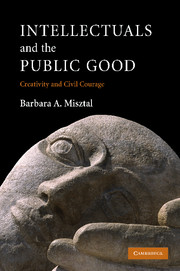Book contents
- Frontmatter
- Contents
- List of tables
- Acknowledgements
- Introduction
- Part I Theoretical framework
- Part II Public intellectuals: the case of the Nobel Peace Prize laureates
- 5 Intellectuals for peace
- 6 Heroes: legends in their own time
- 7 Dissidents: peaceful rebels
- 8 Champions: promoting the cause
- 9 Pioneers: bringing science to politics
- Conclusion
- References
- Index
9 - Pioneers: bringing science to politics
Published online by Cambridge University Press: 22 September 2009
- Frontmatter
- Contents
- List of tables
- Acknowledgements
- Introduction
- Part I Theoretical framework
- Part II Public intellectuals: the case of the Nobel Peace Prize laureates
- 5 Intellectuals for peace
- 6 Heroes: legends in their own time
- 7 Dissidents: peaceful rebels
- 8 Champions: promoting the cause
- 9 Pioneers: bringing science to politics
- Conclusion
- References
- Index
Summary
Visionary ways of shaping uncharted territories
Searching for definitions of ‘pioneer’ in dictionaries or on the Web, it soon becomes clear that the main meaning of this term refers to a person who originates or helps open up a new line of thought, art, research or technology – an innovator who initiates or participates in new developments. Using this conception of the term, we describe the achievements of leading scientists by stressing that they are pioneers – such as a pioneer of artificial intelligence or a pioneer in aviation. The second meaning of the notion refers to a pioneer as a person who first enters a new field or settles a new region, opening it up for others; in other words, pioneers are the first colonists or settlers in a new territory. These two definitions can overlap when pioneering refers to a situation in which both actions take place simultaneously, when both activities – the developing of something new and the exploring of uncharted areas – occur at the same time. For example, with reference to the surgeons who pioneered organ transplants, we suggest both they participated in the creation of something new and that they went into a previously unexplored field of medical practice.
Our definition of ‘pioneer’, as developed in chapter 4, puts the emphasis on this double meaning of the term. The category of pioneers is located in the informalised system underwritten by a relatively high level of frustration.
- Type
- Chapter
- Information
- Intellectuals and the Public GoodCreativity and Civil Courage, pp. 210 - 237Publisher: Cambridge University PressPrint publication year: 2007



